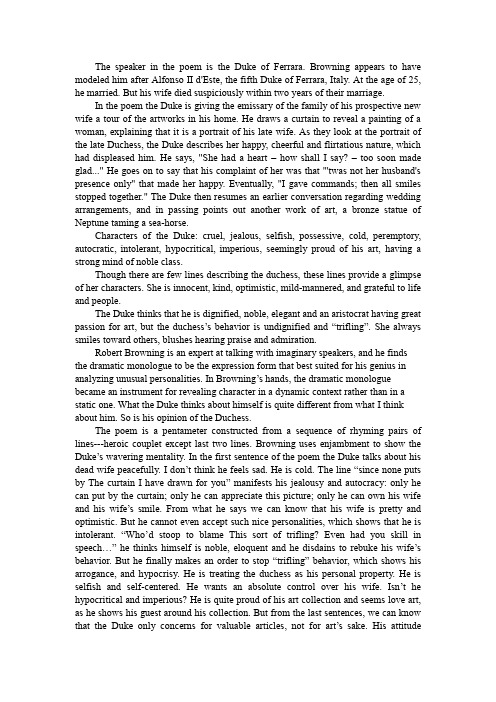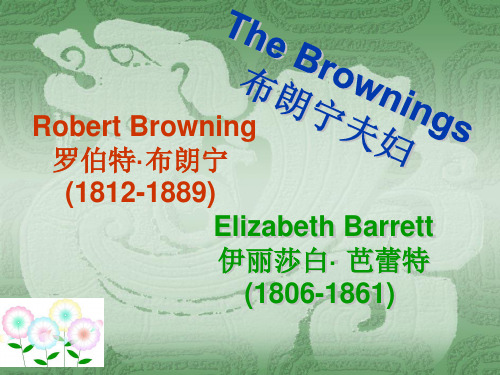诗歌Robert Browning
- 格式:ppt
- 大小:3.95 MB
- 文档页数:11


The speaker in the poem is the Duke of Ferrara. Browning appears to have modeled him afterAlfonso II d'Este, the fifth Duke of Ferrara, Italy. At the age of 25, he married. But his wife died suspiciously within two years of their marriage.In the poem the Duke is giving the emissary of the family of his prospective new wife a tour of the artworks in his home. He draws a curtain to reveal a painting of a woman, explaining that it is a portrait of his late wife. As they look at the portrait of the late Duchess, the Duke describes her happy, cheerful and flirtatious nature, which had displeased him. He says, "She had a heart –how shall I say? –too soon made glad..." He goes on to say that his complaint of her was that "'twas not her husband's presence only" that made her happy. Eventually, "I gave commands; then all smiles stopped together." The Duke then resumes an earlier conversation regarding wedding arrangements, and in passing points out another work of art, a bronze statue of Neptune taming a sea-horse.Characters of the Duke: cruel, jealous, selfish,possessive,cold,peremptory, autocratic,intolerant, hypocritical,imperious, seeminglyproud of his art, having a strong mind of noble class.Though there are few lines describing the duchess, these lines provide a glimpse of her characters.She is innocent, kind, optimistic,mild-mannered, and grateful to life and people.The Duke thinks that he is dignified, noble, elegant andan aristocrat having great passion for art, but the duchess’s behavior is undignified and “trifling”. She always smiles toward others, blushes hearing praise and admiration.Robert Browning is an expert at talking with imaginary speakers, and he finds the dramatic monologue to be the expressionform that best suited for his genius in analyzing unusual personalities. In Browning’s hands, the dramatic monologue becamean instrument for revealing character in a dynamic context ratherthan in a static one. What the Duke thinks about himself is quite different from what I think about him. So is his opinion of the Duchess.The poem is a pentameter constructed from a sequence of rhyming pairs of lines---heroic couplet except last two lines. Browning uses enjambment to show the Duke’s wavering mentality. In the first sentence of the poem the Duke talks about his dead wife peacefully. Idon’t think he feels sad. He is cold. The line “since none puts by The curtain I have drawn for you” manifests his jealousy and autocracy: only he can put by the curtain; only he can appreciate this picture; only he can own his wife and his wife’s smile.From what he says we can know that his wife is pretty and optimistic. But he cannot even accept such nice personalities, which shows that he is intolerant.“Who’d stoop to blame This sort of trifling? Even had you skill in speech…”he thinks himself is noble, eloquent and he disdains to rebuke his wife’s behavior. But he finally makes an order to stop “trifling”behavior, which shows his arrogance, and hypocrisy. He is treating the duchess as his personal property. He is selfish and self-centered.He wants an absolute control over his wife. Isn’t he hypocritical and imperious? He is quite proud of his art collection and seems love art, as he shows his guest around his collection. But from the last sentences, we can know that the Duke only concerns for valuable articles, not for art’s sake. His attitude toward art is notsincere. And the paint of his wife is not a painting in memory of her, but just one of the collections which he can show to others.Just after talking about his late wife, the Duke then resumes an earlier conversation regarding wedding arrangements, whichproves his ruthlessness and greed for money. Maybe also he wants to indicate that he expects his new wife a “dignified” one, or else she may have the same fate as the late Duchess.“his fair daughter…is my object.”here “object”is a pun: it means aims or purpose, and physical object, something not alive.Female in the Duke’s eyes is materialized, just like the paint, the dowry, the Neptune, the Taming a sea-horse.As for the duchess, she is not trifling as the Duke thinks. The words from the painters “called that spot of joy”. She is pure, innocent, and bashful. “she liked whate’er she looked on, and her looks went everywhere.”“the dropping of the daylight in the West”, “ the bough of cherries”“the white mule she rode with” make her blush. She loves nature and life. “not plainly set Herself wits to yours, forsooth, and made excuse” she is mild-mannered.“she smiled, no doubt, Whene’erI passed her; but who passed without Much the same smile?The Duchess smiles to everyone passing her without discrimination, which shows her enthusiasm.T he line“all smiles stopped together”may manifest the duchess’s death. Peoplebelieve that the duke has killed the duchess. However, whenBrowning was asked about the final fate of the duchess, he firstly said“yes, the demand is to kill the duchess.”After a while,he turned his answer into that “perhaps the Duke will imprisonthe duchess in a convent.”T here is no need for Browning to tell us what on earth happened to the Duchess, there is no right or the ultimate explanation existing but the readers’ self-exploration. We can formulate a viable interpretation of the poem. As Browning once put it “The creation of the poem is to reside the infinite into thefinite.”Browning didn’t tell us what happened to the Duchess, but he did depict some characteristic of the Italian Renaissance, though it was not purport to show the view of marriage or something else during the Renaissance. The Italian Renaissance was the earliest manifestation of the general European Renaissance, a period of great cultural change and achievement that began in Italy during the 14th century and lasted until the 16th century. In that period of time, magnificent art can be created, as in the poem the paint of the Duchess, and Neptune.At that time, noble class like the Duke still exercised absolute power. But the Duchess’s attitude towards the nobles reflects that she stands for the democracy influenced by the Renaissance (against the capitalist class). It is worth mentioning the Dowry Funds System. Dowry had social and symbolic function. The scale of dowry shown the identity and status of the couple and the honor the bride’s family deserved.Although in his early years, his works got few attentions, he had come to be regarded as one of the most important poets of the Victorian period. In a Browning monologue, unlike a soliloquy, the meaning is not what the speaker voluntarily reveals but what he inadvertently gives away, usually while rationalising past actions or special pleading his case to a silent auditor.These monologues greatly influenced many later poets, including T.S Eliot and Ezra Pound.Reference:/wiki/Robert_Browning#Further_reading /wiki/My_Last_Duchess Deconstructing the Duke and the Duchess in “My Last Duchess”。


罗伯特·勃朗宁的诗主题:罗伯特·勃朗宁的诗要求:1.至少写10首罗伯特·勃朗宁的诗2.排版格式优美3.诗歌题材、风格多样4.注意用诗歌语言表达情感和人生哲理5.规范使用标点符号和语法以下是我写的10首罗伯特·勃朗宁的诗:1. 情诗:你是我生命中最爱的人你是我生命中最爱的人,你是我欣赏的天空,你是我所看到的阳光,你是我爱的所有。
2. 社会诗:我们应该反抗压迫我们应该反抗压迫,为自由,为人权,我们应该谴责压迫者,让压迫不再存在。
3. 发现自我诗:我成为了我想成为的人我成为了我想成为的人,我跨过了一切阻碍,我找到了自己的方向,我站在自己前面的路上。
4. 呼吁和平诗:停止战争,传递爱停止战争,传递爱,让我们和平和睦,不要让战争摧毁我们的未来,我们需要生活在和平中。
5. 爱情诗:我深深地爱你我深深地爱你,我的心每一秒钟都在想你,我知道我们的爱是真实的,有你的世界,我才完整。
6. 献给母亲的诗:母亲,你是我的天使母亲,你是我的天使,你是我人生中的指南针,我的生命因有你而美好,在我最困难的时刻,你一直是我的支持者。
7. 生命哲理诗:生命是一场旅程生命是一场旅程,我们有时会跌倒,有时会失去方向,但我们必须坚持前进。
8. 离别诗:虽然我要离开,但我的心永远在你那里虽然我要离开,但我的心会留在你那里,我会想念你的微笑和温暖,直到我们再次相聚。
9. 呼吁环保诗:让我们保护地球让我们保护地球,让我们关注气候变化,我们需要采取行动,为了我们的未来和下一代的生命。
10. 自由之歌:让我们跨过那道门让我们跨越那道门,去探索新的领域,让我们勇敢地跨越它,去寻找真正的自由。

罗伯特.勃朗宁经典爱情诗歌两首
罗伯特·勃朗宁 Robert Browning,英国维多利亚时代唯一可与丁尼生媲美的诗人。
勃朗宁的小诗《夜会》中没有热烈而缠绵的描述,而是用他最擅长的戏剧性描写手法,将小伙子盼望见到爱人的急切心情宣泄得淋漓尽致。
看,小伙子在漆黑的夜晚,驾着小船驶过海湾,越过海滩,穿过田野,终于来到了爱人的身边,直到“两颗跳动的心紧紧相融”。
当太阳为他铺开一条金色大道,他没有留恋甜蜜的爱情,而是想到了自己的职责和任务,一个刚毅的男子汉展现在我们的面前。
由此,《夜会》和《晨别》作为一个整体,给我们全面勾勒了勃朗宁的爱情观。

How Do I Love Thee-赏析《How Do I Love Thee》是英国诗人伊丽莎白·勃朗宁(Elizabeth Barrett Browning)的代表作品之一,这首诗是写给她的丈夫罗伯特·勃朗宁(Robert Browning)的情书。
这首诗以十四行诗的形式表达了作者对丈夫的深深爱意。
该诗由14行组成,分为八个句子,采用押韵格式,每个句子的韵脚都不相同。
这首诗的叙述方式简洁明了,情感真挚,格调高雅。
诗歌的第一句“我将爱你,直到生命的尽头”,表达了作者对丈夫无尽的爱意。
第二行“我的灵魂可以飞越每一寸寻常的土地,寻找灵魂的自由”,是诗人表达彼此关系在灵魂层面上的奇妙交流。
第三句起,诗人阐述她爱丈夫的方式,有着一种唯美的表达:“我爱你笑脸上的微笑,和你真诚的眼神;我爱你在每个夜晚和每个清晨轻声细语的对我说话;我爱你先前悲伤过的心情,也爱你今后的喜悦”……整篇诗展现出诗人深深的感情,让人感到温馨和幸福。
在伊丽莎白·勃朗宁的笔下,爱的力量无穷无尽,能够超越时间和空间的限制,还能穿越灵魂的坚壁,直抵彼此的内心深处。
诗人表达了她深深的爱意,让人感受到一个温馨甜美的爱的故事。
诗人的语言优美动听,充满了诗意。
整篇诗中,词语选用精细,富有色彩与画面感,这些词汇同样使读者产生情感共鸣。
例如,“生命的尽头”、“飞越”、“寻找灵魂的自由”等独特的表述,使诗的意境更加深刻、生动,给人留下了深刻的印象。
总的来说,这首诗歌是一首表达爱的经典诗歌,表现出了一种纯粹、忠实且真诚的爱情。
它深情地传递了作者的爱意,并展示了她对爱情与生命的领悟。
"My Last Duchess" - <我已故的公爵夫人>诗歌欣赏: 罗伯特.布朗宁(Robert.Browning) - 我已故的公爵夫人(:My Last Duchess")My Last DuchessRobert BrowningThat's my last Duchess painted on the wall,Looking as if she were alive. I callThat piece a wonder, now: FràPandolf's handsWorked busily a day, and there she stands.Will 't please you sit and look at her? I said'FràPandolf' by design, for never readStrangers like you that pictured countenance,The depth and passion of its earnest glance,But to myself they turned (since none puts byThe curtain I have drawn for you, but I)And seemed as they would ask me, if they durst,How such a glance came there; so, not the firstAre you to turn and ask thus. Sir, 't was notHer husband's presence only, called that spotOf joy into the Duchess' cheek: perhapsFràPandolf chanced to say, 'Her mantle lapsOver my lady's wrist too much,' or 'PaintMust never hope to reproduce the faintHalf-flush that dies along her throat:' such stuffWas courtesy, she thought, and cause enoughFor calling up that spot of joy. She hadA heart -- how shall I say? -- too soon made glad,Too easily impressed; she liked whate'erShe looked on, and her looks went everywhere.Sir, 't was all one! my favour at her breast,The dropping of the daylight in the West,The bough of cherries some officious foolBroke in the orchard for her, the white muleShe rode with round the terrace -- all and eachWould draw from her alike the approving speech,Or blush, at least. She thanked men, -- good! but thanked Somehow -- I know not how -- as if she rankedmy gift of a nine-hundred-years-old nameWith anybody's gift. Who'd stoop to blameThis sort of trifling? Even had you skillIn speech -- (which I have not) -- to make your willQuite clear to such an one, and say, 'Just thisOr that in you disgusts me; here you miss,Or there exceed the mark' -- and if she letHerself be lessoned so, nor plainly setHer wits to yours, forsooth, and made excuse,-- E'en then would be some stooping; and I choose Never to stoop. Oh, sir, she smiled, no doubt,Whene'er I passed her; but who passed withoutMuch the same smile? This grew; I have commands; Then all smiles stopped together. There she standsAs if alive. Will 't please you rise? We'll meetThe company below then. I repeat,The Count your master's known munificenceIs ample warrant that no just pretenceOf mine for dowry will be disallowed;Though his fair daughter's self, as I avowedAt starting, is my object. Nay, we'll goTogether down, sir. Notice Neptune, though, Taming a sea-horse, thought a rarity,Which Claus of Innsbruck cast in bronze for me!我的前公爵夫人墙上的这幅面是我的前公爵夫人,看起来就像她活着一样。